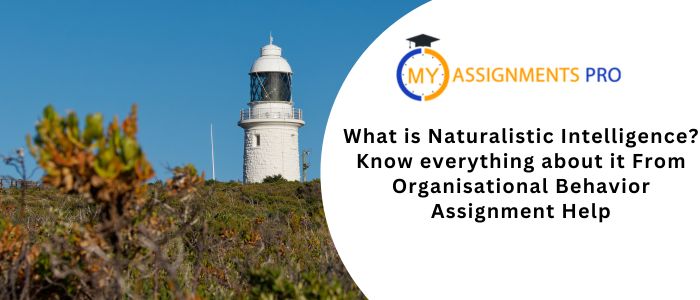
What is Naturalistic Intelligence? Know everything about it From Organisational Behavior Assignment Help
Naturalistic intelligence taking-in of something that people have introduced relative to the world which began to be more inner-sourced by their bringing up in this world into a type or category of very important, but often unacknowledged intelligences. According to Howard Gardner in the very pioneering and famous Thesis of Multiple Intelligences, intelligence refers to the capacity of a person or an individual to identify, classify, and interact with aspects of nature, including ecosystems, plants, and animals. Such intelligence has been important in sustainable habits, problem-solving abilities, and environmental consciousness. Beyond its use in disciplines like biology and conservation, naturalistic intelligence also has an impact on organizational behavior, where it may guide sustainable strategy, team dynamics, and decision-making. Understanding naturalistic intelligence is essential whether you're a professional investigating the subtleties of human capacities or a student studying organizational behavior. This blog will walk you through its definition, traits, and uses while demonstrating how professional organizational behavior assignment help may improve your comprehension and academic performance.
What is Naturalistic Intelligence? An Overview by “Do My Assignment”
Somewhat his many kinds of intelligence, naturalistic intelligence refers to the ability to recognize, categorize, and sometimes even manipulate one's natural environment. It's reflected in sensitivity to plants, animals, and ecosystems within the manifest understanding of a person. As per organizational behavior assignment help, strong naturalistic thinkers frequently have a natural interest in the world around them, demonstrating a gift for identifying species, analyzing natural events, and spotting patterns in the natural world.
This type of intelligence encompasses more than just biology and environmental sciences; it also involves figuring out how human actions affect the environment and coming up with sustainable solutions. High degrees of naturalistic intelligence are frequently needed for professions like ecologists, botanists, wildlife photographers, and environmentalists.
By encouraging innovative problem-solving and eco-friendly practices, naturalistic intelligence in organizational behavior may strengthen a team's emphasis on sustainability and creativity, making it a useful quality in a variety of fields.
Key Characteristics of Naturalistic Intelligence by “Do My Assignment” Services
A distinct collection of characteristics that mark apart people with a strong bond with nature is known as naturalistic intelligence. These traits demonstrate their capacity to comprehend, value, and engage with nature in productive ways. Here is a detailed summary of the main characteristics of naturalistic intelligence:
Keen Observation Skills
People with naturalistic intelligence are remarkably adept at identifying details, patterns, and environmental changes. Their attention to detail is astounding, whether they are monitoring animal behavior or seeing minute variations in plant species.
Strong Classification Abilities
They are quite good at classifying and arranging natural components, including geographical characteristics, animals, and plants. As per our “do my assignment” services, This ability is essential for tasks like ecological model building and biodiversity studies.
Sensitivity to Environmental Changes
People who possess this intelligence frequently pick up on even the smallest environmental changes, such as modifications to ecosystems, habitats, or weather patterns. They can immediately adjust or take proactive measures in natural situations because of their increased awareness.
Curiosity About Nature
These people study ecology, biology, and geology because they have an innate desire to learn about the environment. Their excitement feeds their curiosity about the functioning of natural systems and the interactions between various parts.
Empathy for Living Beings
They exhibit a strong feeling of concern and care for animals, plants, and the environment in general. This compassion frequently manifests in initiatives to protect the environment and promote sustainable lifestyles. Our “do my assignment” services also conduct regular guided sessions for students to provide them with a better understanding of the subject matter.
Problem-solving in Natural Contexts
The capacity to solve environmental problems is a component of naturalistic intelligence. People with this intellect contribute innovative and useful solutions to problems like resource management, habitat degradation, and climate change.
Appreciation for Ecosystems
These people can see how all living and non-living things in the natural world are interrelated when they have a holistic grasp of ecosystems. This viewpoint is essential to preserving ecological equilibrium.
How to Develop Naturalistic Intelligence? A Guide by “Do My Assignment” Services
Developing a closer relationship with the environment and improving your nature-related observational and analytical abilities are two ways to increase your naturalistic intelligence. This is a detailed guide to cultivating this special intelligence:
Spend More Time Outdoors
Developing naturalistic intelligence begins with spending time in nature. To see plants, animals, and ecosystems in their natural settings, visit parks, woods, gardens, or beaches.
Learn to Observe Patterns
Observe recurrent patterns in nature, such as weather patterns, animal behaviors, and seasonal variations. You may hone your analytical abilities by recording these findings in a diary.
Study Environmental Science
Explore topics such as biology, geology, and ecology to develop a fundamental knowledge of the natural world. This information improves your capacity to recognize and categorize different natural components. Our “do my assignment” services have years of experience in assisting students online, and getting them the grade they deserve.
Engage in Gardening or Farming
Planting and nurturing plants can be considered acts of doing things that give clear insights into how ecosystems work. It also encourages the feeling of being responsible and mindful of other living things.
Volunteer for Environmental Causes
People may get practical experience dealing with and safeguarding the environment by taking part in programs like wildlife conservation, beach cleanups, and tree planting.
Observe and Study Wildlife
Take some time to watch animals in their natural environments and record their interactions and activities. This can help you better comprehend the complex interactions that exist within ecosystems. Our “do my assignment” services also offer proofreading and editing services for students. The experts review assignments and edit them making them exceptional.
Use Technology for Learning
Examine tools and applications made for those who like the outdoors, such as guides for stargazing, weather tracking, and apps for identifying plants or birds. These tools increase the accessibility and interest of learning about nature.
Read Books and Watch Documentaries
Learn more by watching documentaries and reading books on wildlife, the environment, and nature. They offer insightful information and motivation to improve your naturalistic intelligence.
Practice Mindfulness in Nature
Spend some time in nature by engaging in contemplative pursuits like hiking, meditation, or just relaxing outside. Our “do my assignment” Your emotional connection to the environment is strengthened as a result.
Teach Others About Nature
Organize seminars, talks, or nature walks to share your expertise and experiences with others. Teaching helps others value the environment and confirms what you have learned.
Challenges in Understanding Naturalistic Intelligence Shared by “Do My Assignment”
Although naturalistic intelligence is a distinctive and worthwhile viewpoint, comprehending and cultivating it presents several difficulties. People may find it challenging to completely accept and develop this kind of intelligence as a result of these challenges. Here are a few major obstacles:
Lack of Exposure to Nature
Many people, particularly those who reside in metropolitan areas, have limited access to natural landscapes in today's urbanized world. As a result of this lack of exposure, people may find it more difficult to interact with nature, which might impede the growth of naturalistic intelligence.
Overreliance on Technology
A surplus of gadgets and technology may lead to alienation from nature. Mode of living such as spending more time in front of a screen rather than outside can minimize a person's greater opportunity to experience something quite deep about nature, whereas it is very close to viewing it. If you're in a dilemma and feel that you won't finish your assignment before the deadline, use our "do my assignment" services.
Limited Educational Focus
Logic, arithmetic, and language abilities are frequently prioritized above environmental studies, biology, and ecology in traditional educational systems. Students may find it more difficult to comprehend naturalistic intelligence if naturalistic subjects are not given enough attention.
Difficulty in Identifying Patterns
Recognizing intricate and nuanced patterns in nature is a component of naturalistic intelligence. Some people might find it difficult to notice these trends, particularly in a society where attention is frequently diverted by technology. Furthermore, it might be difficult for novices to comprehend ecological systems as it calls for a high degree of expertise and endurance. Our “do my assignment” services have years of experience in assisting students with their assignments and thus our experts can effectively assist you and get the grades you desire.
Misunderstanding of Naturalistic Intelligence
The significance and possibilities of naturalistic intelligence are generally underappreciated, particularly in contrast to other forms of intelligence such as linguistic or logical-mathematical intelligence. The growth of this type of intelligence may be constrained because people may not perceive how it might improve their personal and professional lives.
Cultural and Social Barriers
Environmental management and nature may not be highly valued in other cultures. The undervaluation of naturalistic intelligence may result from social and cultural norms that place a higher value on other abilities than on environmental knowledge.
Environmental Degradation
As per “do my assignment” experts, disconnection from nature can result from global environmental problems such as pollution, deforestation, and climate change. Individuals find it more difficult to build a sophisticated grasp of naturalistic intelligence when ecosystems suffer because it becomes more difficult to witness the natural world in its actual form.
Lack of Resources
Not everyone has the means or chances to thoroughly examine nature. While some urban people may find it more difficult to interact with nature, rural places may provide a more diverse environment. The growth of naturalistic intelligence may be constrained by this disparity in access.
Personal Disinterest or Apathy
It may be more difficult for certain people to interact with and acquire naturalistic intelligence if they lack an innate interest in nature or the environment. People might not seek out opportunities to further their learning if they lack a personal connection or enthusiasm for the subject. You can connect with “do my assignment” experts through live sessions and clarify all your doubts and queries.
Overwhelming Information
It can be difficult for people to sort through the vast amount of environmental data that is now available and choose which information is most pertinent to their development of naturalistic intelligence. The confusion brought on by the abundance of information might make it difficult to concentrate on particular facets of nature or environmental research.
Particularly via the study and admiration of nature, naturalistic intelligence provides a special means of comprehending and relating to the world around us. This kind of intelligence can be developed and completely understood despite several obstacles, including insufficient educational concentration, technology distractions, and a lack of exposure to nature. People may improve their naturalistic intelligence by actively seeking out chances to interact with nature, placing a high value on environmental education, and developing an interest in the natural world. In addition to improving our own lives, embracing this intelligence is essential for sustainable living and environmental preservation.
Seeking direction through an expert “do my assignment” may aid your learning process if you want to improve your comprehension of naturalistic intelligence and how it connects to more general ideas in organizational behavior. You may cultivate a closer relationship with nature and use this understanding in a variety of contexts if you have the appropriate tools and attitude.

Samuel
"I am a seasoned Ph.D. scholar with deep expertise with years of rigorous research, publication, and teaching experience, I bring a wealth of knowledge and analytical acumen to complex academic challenges. My work focuses on delivering innovative solutions, advancing knowledge, and fostering academic excellence. Skilled in research methodology, data analysis, and scholarly writing, I have contributed to peer-reviewed journals and mentored students to achieve academic success.


